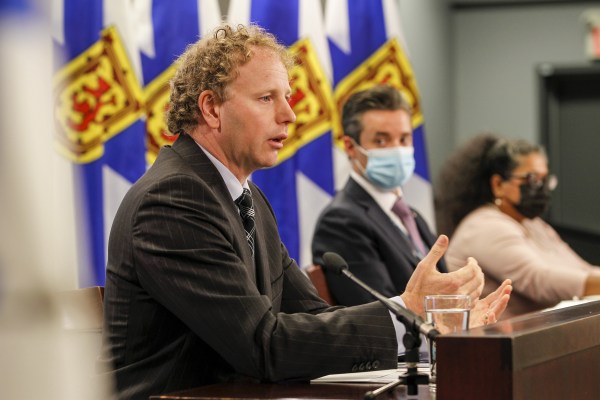
Instead of a deficit of $585 million dollars predicted in the spring budget introduced by the previous Liberal government, the province is now forecasting a shortfall of $444.5 million. Finance Minister Allan MacMaster gave an update on the province’s financial position on Wednesday.
The improvement comes despite $397 million in increased spending by government departments. Much of that is related to expenses associated with the pandemic. For example, the Department of Health and Wellness spent $117 million more than budgeted: $36 million on COVID-19 testing and $8 million for vaccination clinics. Negotiated wage settlements with several health care unions just prior to the provincial election cost $11.8 million and a change in the way physicians choose to get paid added another $8.1 million.
But not all extra spending is tied to the pandemic. Since assuming government in August, the Progressive Conservatives have added $32 million for a new grant to help seniors remain in their homes longer. MacMaster said details of this program will be announced within a few weeks.
The Houston government will also spend an additional $7.8 million in holiday pay (overtime) for essential health care personnel who work today, the newly proclaimed National Day for Truth and Reconciliation. Today’s new holiday is projected to cost taxpayers about $9.4 million.
Other new spending piggybacked on top of federal programs to assist municipalities and $53 million to eventually establish $10-a-day child care programs; both of those expenditures will be recoverable from Ottawa. Since the Progressive Conservatives were elected in August — in a provincial election that cost $13 million — the government has spent $80 million beyond what was included in last spring’s budget.
Besides the $32 million grant to keep seniors out of nursing homes, new money has been allocated for gravel roads, rural rinks, online doctors’ appointments, an advertising campaign to bring more people to Nova Scotia, and $5.5 million to start the process of lifting the tolls on the Cobequid Pass. No date has yet been set for when the toll will come off; 2026 was the original date in the agreement with the Highway 104 Western Alignment Corporation before the PCs promised to scrap it “immediately.”
Keeping election promises
Reporters asked MacMaster whether the province’s financial position is strong enough for the PCs to keep all the financial commitments they made during the election campaign.
“Even though we made the commitment for deficit-spending, if necessary, to fix health care, we still need to watch every dollar that goes out the door,” MacMaster said. “Even though we are in the middle of a fiscal year, it’s time for us to put our stamp on things as a new government and some of the changes we want to make I believe Nova Scotians are looking for.”
NDP Finance spokesperson Lisa Lachance issued a news release critical of the PC government for not spending more to address climate change and affordable housing.
“Nova Scotians expect to see action from the Conservatives on these two pressing issues,” said the MLA who toppled former MLA and Finance Minister Labi Kousoulis in Halifax. “COVID-19 has had an unprecedented impact on the province’s finances. Addressing the housing and climate crises must be a part of our recovery plan moving forward.”
The Liberals added $23 million since the spring budget to address recommendations made by the Affordable Housing Commission. Very little additional funding was directed toward fighting climate change. Prior to the minister’s speech, senior officials with the Department of Finance walked reporters through some of the numbers. Real Gross Domestic Product (GDP) actually fell less in 2020 than anticipated in the previous budget; a contraction of 3.2% instead of 5.3%. The spring budget did factor in a potential third wave of COVID restrictions, but did not anticipate a fourth wave this fall.
Finance department officials expect it will be 2022 before the economy returns to where it was before the pandemic. And while economic activity continues to ebb and flow based on measures imposed to restrain outbreaks of the virus, provincial economists say tourism, retail, financial services, and insurance services will face long-term challenges as these industries adapt to people working from home and more online shopping.
Another wild card is how much the province may lose in taxes paid by corporations. Corporate income tax is off $7.6 million from budget projections this year but a rule that allows companies to carry forward losses for a period of three years could have a much bigger impact on provincial revenues next year.
A little good news
The reason Nova Scotia is not as bad off as predicted has a lot to do with receiving money from Ottawa; at least $210 million. There was $103 million that flowed as a one-time increase in health transfer payments, $35.6 million under the COVID-19 Safe Restart program, and a deferred payment of $85.6 million from a federal-provincial sharing agreement on offshore natural gas royalties.
On the provincial income front, Nova Scotians contributed an unexpected $86 million more in personal income tax and the province got an $101 million windfall when an investment by its venture capital agency, Innovacorp, turned out to be winner. Innovacorp recently sold its equity stake in Meta Materials, a company based in Dartmouth that engineers a suite of products using light and nanotechnology, for a profit of $101 million.
Meanwhile, the provincial debt has risen to a staggering $12.9 billion dollars. The fact that interest rates remain low means the cost to service the debt (paying interest on the principal) is expected to be $22 million lower this year than what was forecast back in March. That may be a small consolation considering the bill will be in the billions — and rising—when it eventually comes due but for now that does not appear to be a major consideration.
Subscribe to the Halifax Examiner



We have many other subscription options available, or drop us a donation. Thanks!
